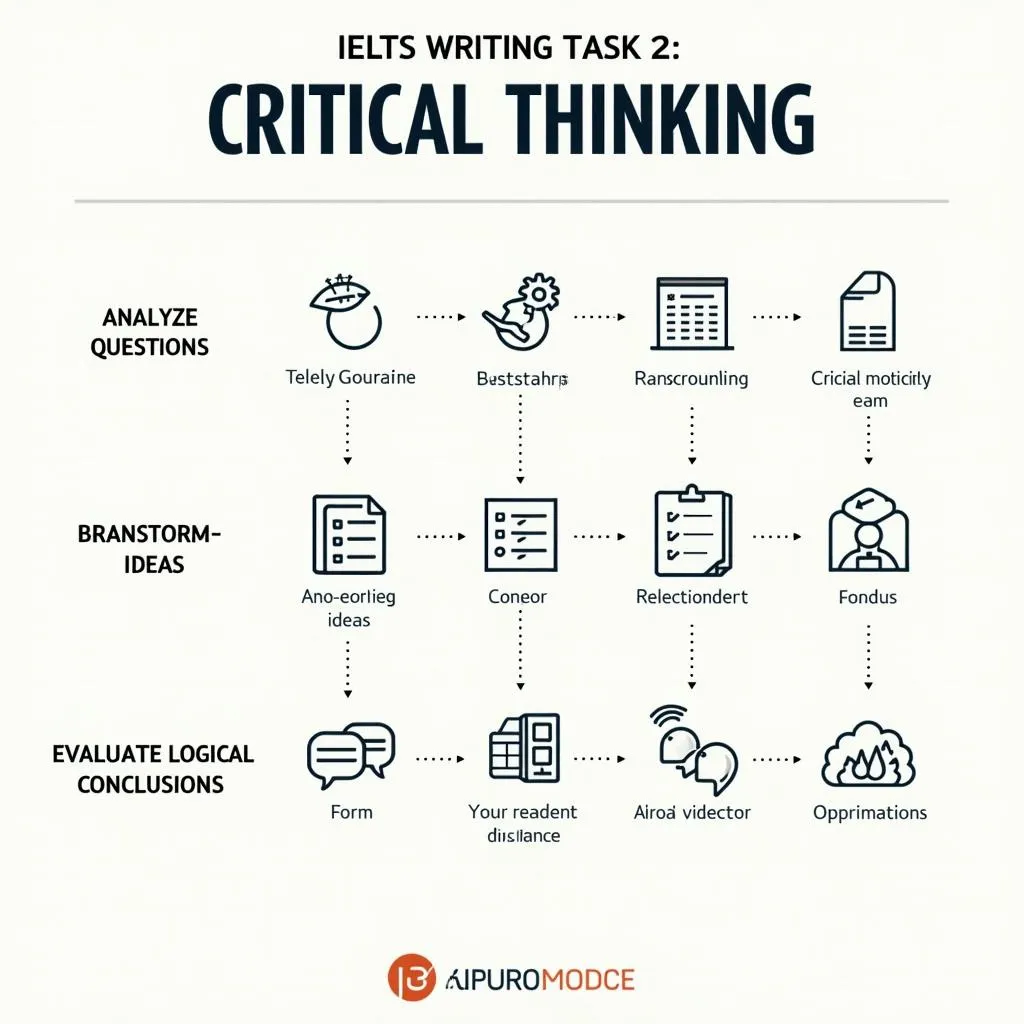Understanding Critical Thinking in IELTS Writing
Critical thinking is an essential skill for success in IELTS Writing Task 2. It involves analyzing information, evaluating arguments, and forming well-reasoned judgments. In the context of IELTS, critical thinking enables candidates to:
- Interpret essay questions accurately
- Generate relevant ideas and examples
- Develop logical arguments
- Evaluate different perspectives objectively
By honing your critical thinking abilities, you can significantly improve your performance in IELTS Writing Task 2 and achieve a higher band score.

Key Components of Critical Thinking for IELTS Writing
1. Analyzing the Question
The first step in applying critical thinking to IELTS Writing Task 2 is thoroughly analyzing the question. This involves:
- Identifying the topic and scope
- Recognizing the task type (e.g., agree/disagree, discuss both views, advantages/disadvantages)
- Highlighting key words and phrases
For example, consider this IELTS Writing Task 2 question:
“Some people believe that universities should focus on providing academic skills, while others think they should focus on preparing students for employment. Discuss both views and give your opinion.”
In this question, you need to:
- Identify the topic: The role of universities in education
- Recognize the task type: Discuss both views and give your opinion
- Highlight key phrases: “academic skills” and “preparing for employment”
2. Generating Ideas and Examples
Once you’ve analyzed the question, the next step is to generate relevant ideas and examples. Critical thinking helps you:
- Brainstorm ideas from different perspectives
- Evaluate the relevance and quality of your ideas
- Select the most appropriate examples to support your arguments
For the question above, you might consider:
- Benefits of focusing on academic skills (e.g., developing research abilities, critical thinking)
- Advantages of preparing students for employment (e.g., practical skills, industry connections)
- Real-world examples of universities that excel in either approach
3. Developing Logical Arguments
Critical thinking is crucial for constructing logical and coherent arguments in your essay. This involves:
- Organizing your ideas in a clear structure
- Establishing connections between different points
- Ensuring each paragraph flows logically to the next
For example, you might structure your essay like this:
- Introduction: Present the topic and your thesis statement
- Body Paragraph 1: Discuss the view favoring academic skills
- Body Paragraph 2: Explore the perspective of preparing for employment
- Body Paragraph 3: Provide your opinion with supporting reasons
- Conclusion: Summarize main points and restate your position
4. Evaluating Different Perspectives
A key aspect of critical thinking in IELTS Writing Task 2 is the ability to evaluate different perspectives objectively. This includes:
- Considering pros and cons of each viewpoint
- Recognizing potential biases or limitations in arguments
- Balancing different opinions in your essay
For instance, when discussing the role of universities, you might evaluate:
- The long-term benefits of academic skills versus immediate employability
- The evolving needs of the job market and how universities can adapt
- The potential for integrating both academic and practical skills in education
Applying Critical Thinking Techniques
To enhance your critical thinking skills for IELTS Writing Task 2, try these techniques:
- Practice analyzing sample questions and identifying key elements
- Use mind maps or brainstorming techniques to generate and organize ideas
- Develop arguments for and against various topics to improve your analytical skills
- Read widely on diverse subjects to broaden your knowledge and perspectives
- Engage in debates or discussions to practice evaluating different viewpoints
Common Pitfalls to Avoid
When applying critical thinking to IELTS Writing Task 2, be aware of these common mistakes:
- Misinterpreting the question or addressing only part of it
- Presenting biased or one-sided arguments
- Failing to support claims with relevant examples
- Overlooking potential counterarguments
- Drawing hasty conclusions without sufficient analysis
By being mindful of these pitfalls and consistently practicing critical thinking techniques, you can significantly improve your performance in IELTS Writing Task 2.
Next Steps for Improvement
To further develop your critical thinking skills for IELTS Writing Task 2:
- Regularly practice analyzing IELTS Writing Task 2 questions and planning responses
- Seek feedback on your essays from teachers or experienced IELTS tutors
- Review high-scoring sample essays to understand effective critical thinking in action
- Engage in timed writing practice to improve your ability to think critically under pressure
- Reflect on your own thought processes and identify areas for improvement
Remember, mastering critical thinking for IELTS Writing Task 2 is an ongoing process that requires consistent practice and self-reflection. By dedicating time to honing these skills, you’ll be well-prepared to tackle any IELTS Writing Task 2 question with confidence and clarity.